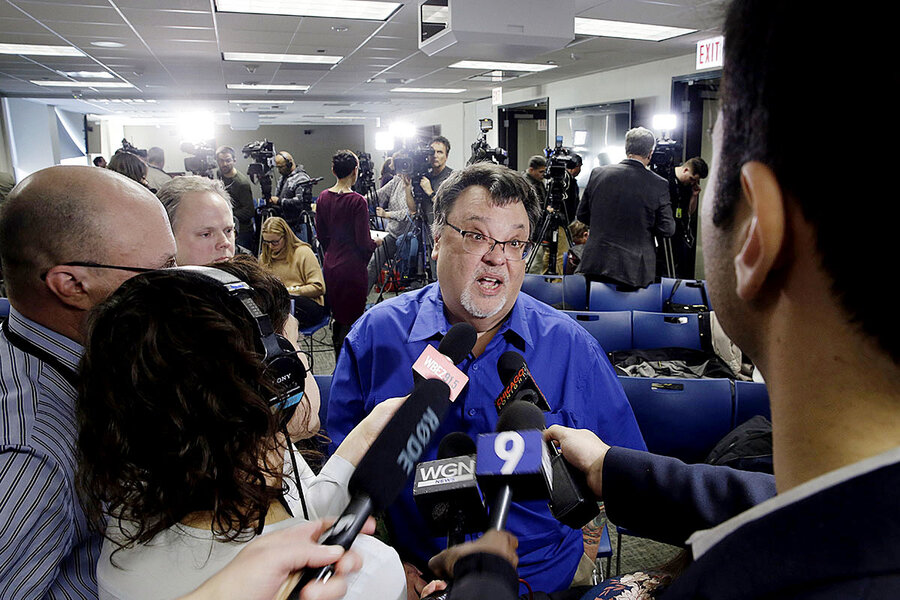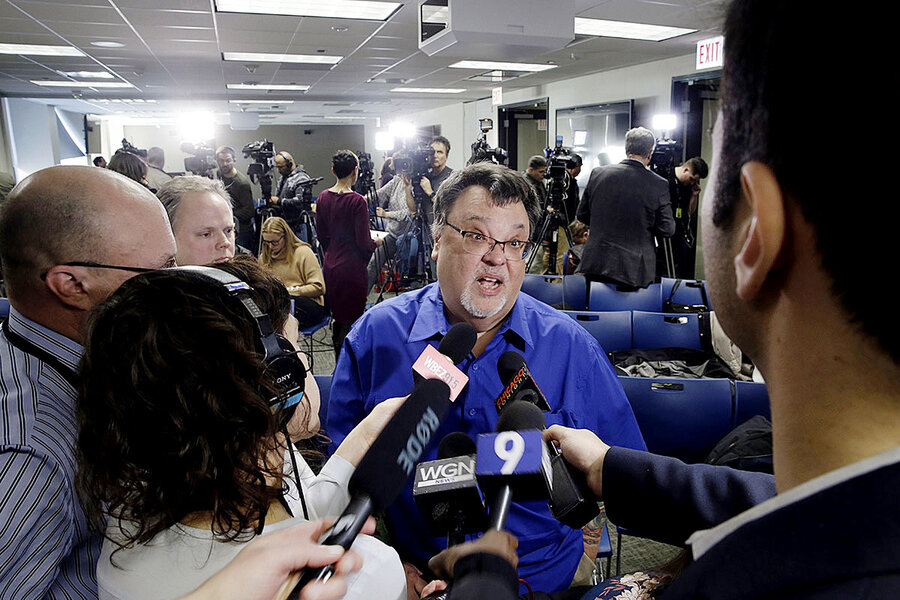When getting the story means years of threats, even bullets
Loading...
Former Philadelphia Daily News reporter Nicole Weisensee Egan says she faced incessant intimidating calls from Bill Cosby’s lawyer as she investigated sexual abuse claims in 2005. Some media slammed her reporting on “America’s dad.”
“I had it coming at me at all sides, but my newspaper had my back the entire time,” says Ms. Egan.
Why We Wrote This
The rich and powerful have always pushed back on investigative journalists. But when it comes to sexual crimes, the threats are losing to the pursuit of truth.
Reporters who pursue sexual misconduct allegations against high-profile individuals say they face a flurry of pressure – from fans, newsrooms, and targets of stories. But the increasing impact of investigative journalism in exposing sexual violence cases may point to something promising: The pushback isn’t working.
“The bigger the targets, the more pushback you get,” says Mark Feldstein, a former investigative journalist and journalism historian. “But what actually strikes me about #MeToo is kind of the opposite – yeah they’re fighting back, but they’re not succeeding.”
Some observers point to Mr. Cosby’s 2018 conviction as a #MeToo milestone. The entertainer is serving three to 10 years for sexual assault.
“Sometimes you choose a story, and sometimes it chooses you,” says Jim DeRogatis, who has spent 20 years investigating R. Kelly. “I think you don’t let go of it if you are a journalist. Not when people are being hurt.”
As a music critic for the Chicago Sun-Times, Jim DeRogatis received his first tip about R. Kelly via fax. It alluded to the R&B star’s problem with “young girls.” The critic broke the story of Mr. Kelly’s alleged sex with minors in December 2000.
The following month, Mr. DeRogatis received an anonymous sex tape. Within 12 hours, a bullet burst through his front porch window.
“I cannot say it was R. Kelly, but I think it was a message,” he says.
Why We Wrote This
The rich and powerful have always pushed back on investigative journalists. But when it comes to sexual crimes, the threats are losing to the pursuit of truth.
Mr. DeRogatis has covered Mr. Kelly for two decades, interviewing dozens of women who claim they survived the musician’s abuse. Mr. Kelly, who faces 18 charges from two federal indictments, was denied bond this week. He has pleaded not guilty to the charges.
Mr. DeRogatis’ peers used to deride his coverage of the famed Chicagoan. Today, many herald Mr. DeRogatis’ work as helping advance justice.
It’s hard to separate empty threats from real danger, he says, though he recognizes that survivors of sexual crimes have it much worse. Mr. DeRogatis says he took heat from members of Mr. Kelly’s camp, including a phone call with the message, “We know you have a daughter.” Online attacks spiked around the release last month of his book, “Soulless: The Case Against R. Kelly.” To his alarm, people have circulated images and video of his family on social media. “I never slowed down for a minute,” he says. “If anything, it redoubled my efforts.”
Reporters who pursue sexual misconduct allegations against high-profile individuals say they face a flurry of pressure – from fans, newsrooms, and targets of stories. But the increasing impact of investigative journalism in exposing sexual violence cases may point to something promising: The pushback isn’t working.
“The bigger the targets, the more pushback you get,” says Mark Feldstein, a former investigative journalist and journalism historian. “But what actually strikes me about #MeToo is kind of the opposite – yeah they’re fighting back, but they’re not succeeding.”
Not so two decades ago. Journalists had dug into Harvey Weinstein’s rumored abusive behavior years before his arrest in May 2018. Mr. DeRogatis says three newsrooms turned down his story on Mr. Kelly’s alleged sex cult before BuzzFeed published it in July 2017. Former Vanity Fair reporter Vicky Ward tried to reveal allegations against financier Jeffrey Epstein in the early 2000s.
While reporting a profile, Ms. Ward says she landed on-the-record interviews with two sisters who accused Mr. Epstein of sexual abuse. One alleged she’d been underage.
Leading up to publication, Ms. Ward, who was pregnant with twins at the time, says he called multiple times to threaten her and her unborn children, warning something would happen if the story displeased him. A lawyer for Mr. Epstein did not return requests for comment.
“I actually had to ask the hospital to make sure that they had 24/7 security for two months,” Ms. Ward said on a Slate podcast. “It was a horrendous time.”
As for the threats, “they made me more determined to nail” the story, Ms. Ward wrote in an email to the Monitor.
However, the women’s allegations were excised from the 2003 Vanity Fair profile. Graydon Carter, Vanity Fair’s then-editor, defended the cut, saying he “didn’t have confidence in Ward’s reporting,” Politico reported.
The registered sex offender’s arrest and new charges in July came 11 years after a controversial nonprosecution agreement. Alexander Acosta, who helped broker the deal as a U.S. attorney, resigned as U.S. labor secretary last week. Many credit extensive reporting by Miami Herald journalist Julie K. Brown for renewing scrutiny of Mr. Epstein.
“We were assisted by some excellent investigative journalism,” said U.S. Attorney Geoffrey Berman for New York’s Southern District. On Thursday, a federal judge denied Mr. Epstein’s request for bail, calling him a danger to the community and a flight risk. Mr. Epstein has pleaded not guilty to the new charges.
Intimidation of the press in the U.S. dates back to the first Colonial newspaper in 1690. British authorities shut down Boston’s Publick Occurrences Both Forreign and Domestick after one issue. President Donald Trump’s calling reporters “enemy of the people” is the latest in a long history of government pressure. In 2018, the killing of five Capital Gazette employees in Maryland brought home to U.S. journalists a horror more often faced by peers abroad. Twenty journalists have been attacked in the U.S. this year, reports U.S. Press Freedom Tracker.
“When we see an increase in harassment and threats to journalists, it can have a real chilling effect on journalism,” says Sarah Matthews, a staff attorney at the Reporters Committee for Freedom of the Press. “It’s depriving the public of important stories.”
In 2017, Republican Senate candidate Roy Moore threatened to sue the news site AL.com, after the local outlet published allegations of his “predatory behavior” toward teenage girls in Etowah County dating back to the 1970s. Mr. Moore’s counsel argued the coverage defamed the former state judge, who denied the claims.
Alabama Media Group rejected the cease-and-desist letter and stood by its reporting. Kelly Ann Scott, AMG’s vice president of content who joined in 2018, says the threat of litigation didn’t pack a punch.
“It made folks even more motivated to pursue the truth,” says Ms. Scott.
“There’s an openness now”
Mr. Weinstein awaits trial for rape and other offenses following his arrest last year. He has denied wrongdoing.
He’d spun a web of enablers with his towering influence who tried to snuff out allegations against him and derail negative press, according to reports in The New York Times and The New Yorker.
Mr. Weinstein allegedly hired private security agencies – including Israeli ex-intelligence officers – to track accusers and journalists, Ronan Farrow reported for The New Yorker in 2017. At the time, a spokesperson for Mr. Weinstein said it was “a fiction” to suggest that individuals were targeted.
A professor of journalism at the University of Maryland, Mr. Feldstein knows well the risks of investigative journalism – he was once beaten up for exposing migrant slavery in Florida in the 1980s. He says there could be more pushback on issues of sexual harassment because of the volume of current coverage.
“The men who predominantly run newsrooms in the United States now have come face to face with what women have found for a long time,” he says. “There’s an openness now to doing those stories, and a willingness now by the sources, the victims, to talk about it in ways that they weren’t willing to before.”
As Ms. Brown began digging into Mr. Epstein’s alleged sex ring in 2017, she’s said, a former Palm Beach, Florida, police chief warned her that previous reporters had failed, and the Miami Herald could face pressure to kill the story. Ms. Brown persisted, poring over thousands of records and tracking more than 60 alleged survivors of sexual abuse. Eight agreed to interviews.
Miami Herald managing editor Rick Hirsch says the #MeToo era contributed to people opening up about what they hadn’t been willing to share before.
The Herald didn’t face threats for its series – “nor would it have mattered,” says Mr. Hirsch.
“I had it coming at me on all sides”
In her book “Chasing Cosby,” former Philadelphia Daily News reporter Nicole Weisensee Egan says she faced incessant intimidating calls from Martin Singer, a former lawyer for Bill Cosby, as she investigated sexual abuse claims in 2005. Some media slammed her reporting on “America’s dad.”
“I had it coming at me on all sides, but my newspaper had my back the entire time,” says Ms. Egan.
She continued to follow the story at People and The Daily Beast. She finally saw the media take the allegations against Mr. Cosby seriously when a joke by comedian Hannibal Buress went viral in 2014. Dozens more women came forward to accuse Mr. Cosby of abuse.
“Cosby could control the media, but he couldn’t control social media,” says Ms. Egan.
Some observers called Mr. Cosby’s 2018 conviction a #MeToo milestone. The entertainer is serving three to 10 years for sexual assault, and continues to deny wrongdoing. An assistant for Mr. Singer did not respond to requests for comment.
Ms. Egan may have been spared online harassment because she uncovered allegations against Mr. Cosby pre-Twitter. Mr. DeRogatis, on the other hand, says he found a “hacker for good” to help him with cybersecurity. Two decades on the story, he perseveres.
“Sometimes you choose a story, and sometimes it chooses you,” says Mr. DeRogatis. “I think you don’t let go of it if you are a journalist. Not when people are being hurt.”










